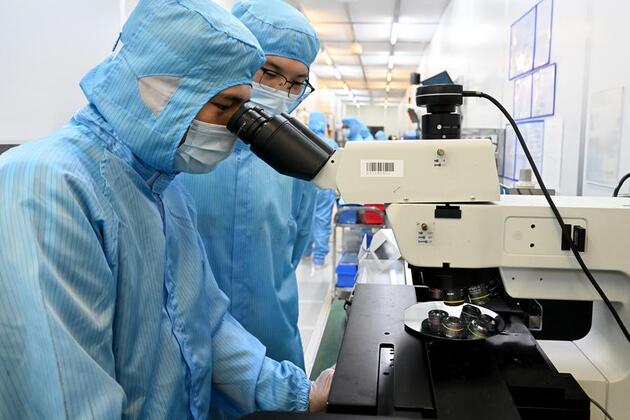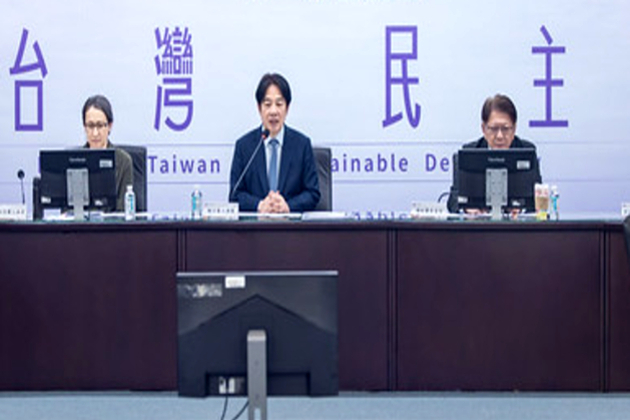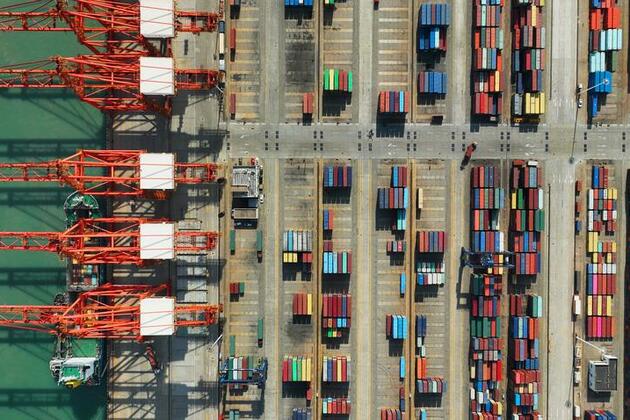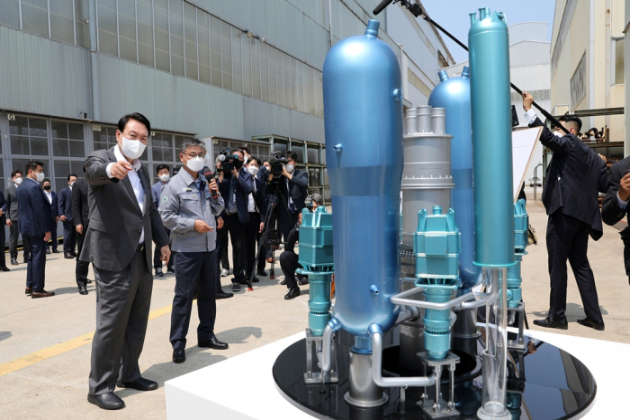"Lab Assistant": AI enhancing scientific research with speed, precision
Xinhua
05 Apr 2025, 22:02 GMT+10

BEIJING, April 5 (Xinhua) -- As scientists are striving to develop AI products and solutions to enhance various industries and daily life, this booming technology is also serving as a "lab assistant," contributing to scientific progress in turn.
In China, AI has been increasingly integrated into diverse research fields, particularly in life sciences, drug discovery and environmental studies. It shows substantial potential to boost efficiency, transform approaches and expedite breakthroughs.
OFFERING EARLY DISEASE DETECTION
Researchers from Shanghai-based Fudan University have made a technological breakthrough in early disease detection. With the assistance of AI, this advancement enables doctors to diagnose and predict diseases simply through a blood test.
Targeted at Alzheimer's disease, the research team used big data and an AI algorithm to screen 1,500 plasma proteins and identified 11 that are capable of predicting dementia risks.
"Through blood tests, we identified that these proteins exhibited consistent changes. With the help of AI-based calculations for disease markers, we were able to detect Alzheimer's disease at least 15 years before diagnosis," lead researcher Yu Jintai said.
"These changes are not caused by genetic modifications but rather due to differences in protein expression," Yu explained. "Much like how a caterpillar transforms into a butterfly."
The study soon garnered attention within the global medical community after being featured in the journal Nature in late 2024. Rather than resting on their laurels, the research team continued their experimental efforts, endeavoring to uncover more relationships between diseases and proteins with the AI tool.
Following an analysis of over 50,000 blood samples and health data collected during a 14-year follow-up study, the team created the world's first atlas of plasma proteins in health and disease states, which can help forecast diabetes and heart disease risks a decade in advance.
Researchers are currently developing a low-cost detection kit, priced under 100 yuan (14 U.S. dollars) to make protein testing as routine as glucose checks.
SLASHING DRUG DEVELOPMENT TIMELINES
At Hangzhou-based Liangzhu Laboratory, a research team has invented an AI algorithm to reduce the development process of a drug for treating progeria, a rare pediatric disease.
The traditional large-scale screening method for small-molecule drug development takes 15 to 20 years, with a high failure rate. However, the AI algorithm can reduce the cycle to approximately 3 to 5 years, accelerating preclinical trials that previously consumed 90 percent of the research time, according to Shen Ning, a researcher in the lab and a member of the program.
Under Zhejiang University, the laboratory in 2021 established a multidisciplinary research team of experts in clinical medicine, bioscience, mathematics, computing and statistics. They have developed several advanced AI algorithms specifically designed for the precise diagnosis of genetic and rare diseases.
China's National Health Commission and other departments jointly issued the guidelines for 84 AI application scenarios in the health sector, including drug research and development.
For decades, the pharmaceutical industry has been confronted with a "double-10" challenge: it usually requires 10 years and an investment of 1 billion U.S. dollars to develop a new drug. Many people believe that AI will be the most promising solution to overcome the long-standing dilemma.
"AI has the potential to impact the entire chain of drug development," said Academician Chen Kaixian of the Chinese Academy of Sciences (CAS).
While no AI-assisted drug development has reached markets yet, multiple candidates are advancing through clinical trials in China.
DECODING CLIMATE CHANGE IMPACTS
In March, CAS researchers and tech company Alibaba Cloud collaboratively unveiled "Luoshu," an AI model that can precisely trace water origins and predict runoff volumes in the Qinghai-Tibet Plateau, which is known as the Asian Water Tower, home to headwaters of over 10 major Asian rivers.
Warming at twice the global average over the past 50 years, the plateau is experiencing an imbalance in its water systems among glaciers, lakes and rivers. This imbalance is expected to exacerbate uncertainties in water supply, energy supply and demand, as well as food production, according to Xia Cuihui, a participant and an associate researcher at the CAS's Institute of Tibetan Plateau Research.
Hydropower generation capacity in glacier regions has declined globally in recent years. Although the reasons remain unclear, it is most likely associated with climate change, the researcher told Xinhua.
The new AI model can help predict water flow for hydropower plants by tracking where the water comes from -- like rain, melting glaciers, or underground water. "If something unusual happens, such as glaciers melting too fast or a bad drought, it will automatically update the water supply predictions," Xia explained.
Compared with conventional approaches, the AI model enhances prediction accuracy by 20 percent and can monitor real-time source contributions. It can alert power grids to prepare for short-term emergencies while providing scientific support for long-term decision-making in clean energy generation.
"Luoshu" is one of the numerous AI models recently launched by the CAS. Several institutes within the country's highest natural sciences academic organization have launched AI tools based on Alibaba's reasoning model, covering applications from astronomical observation to coral species identification.
For researchers like Xia, who holds a Ph.D. in geography, AI has already become an essential tool in the lab, but it is not just about efficiency.
"It unlocks research once deemed impossible," the female scientist added, noting that many research ideas previously limited by traditional methods can now be realized with AI support, promoting greater innovation.
 Share
Share
 Tweet
Tweet
 Share
Share
 Flip
Flip
 Email
Email
Watch latest videos
Subscribe and Follow
Get a daily dose of Hong Kong Herald news through our daily email, its complimentary and keeps you fully up to date with world and business news as well.
News RELEASES
Publish news of your business, community or sports group, personnel appointments, major event and more by submitting a news release to Hong Kong Herald.
More InformationChina
SectionHegseth calls Japan key to countering China, military upgrade planned
TOKYO, Japan: U.S. Defense Secretary Pete Hegseth said Japan is essential for handling China's aggression, especially in the Taiwan...
Taiwan's President Lai gathered officials ahead of Trump's tariffs speech
TAIPEI, Taiwan: Taiwan's leadership was on high alert ahead of the U.S. tariff announcement, with President Lai Ching-te convening...
Radio Free Asia faces shutdown without urgent court relief
WASHINGTON, D.C.: Radio Free Asia, a key voice in press freedom across the continent for nearly three decades, is now warning it may...
US beef sales to China skid after Beijing lets export approvals lapse
CHICAGO, Illinois: U.S. beef exports to China have experienced a sudden slowdown, as a lapse in Chinese regulatory approvals and ongoing...
Update: Multiple Chinese chambers of commerce resolutely oppose U.S. "reciprocal tariffs"
This aerial photo taken on May 9, 2023 shows the container terminal at Lianyungang Port, east China's Jiangsu Province. (Photo by Geng...
"Lab Assistant": AI enhancing scientific research with speed, precision
Staff of Anhui North Microelectronics Research Institute Group Corporation Limited check on MEMS wafers in the China Sensor Valley...
Business
SectionBOC Aviation expands global fleet with major Airbus, Boeing orders
SINGAPORE: BOC Aviation is betting big on the future of air travel, placing major orders with both Airbus and Boeing as it moves to...
Ghibli-inspired AI art boosts ChatGPT usage
SAN FRANCISCO, California: A wave of Ghibli-inspired AI artwork has sent ChatGPT usage skyrocketing, as users have embraced the image-generation...
Virgin Atlantic sees dip in US-UK travel amid economic uncertainty
LONDON, U.K.: Virgin Atlantic is seeing signs of cooling demand from U.S. travelers heading to the UK, a shift that comes after a strong...
Wall Street sheds nearly 6% more as tariffs continue to take toll
NEW YORK, New York - The rout in U.,S. and global stock markets continued and even heightened on Friday, as investors around the world...
FCC investigates Disney, ABC amid diversity policy scrutiny
WASHINGTON/LOS ANGELES: The U.S. government is intensifying scrutiny of corporate diversity policies, with Disney and ABC now under...
US states compete for role in smaller next-gen nuclear power
HARRISBURG, Pennsylvania: New, cheaper nuclear power is on the way, and U.S. states are competing to build and supply the next generation...












